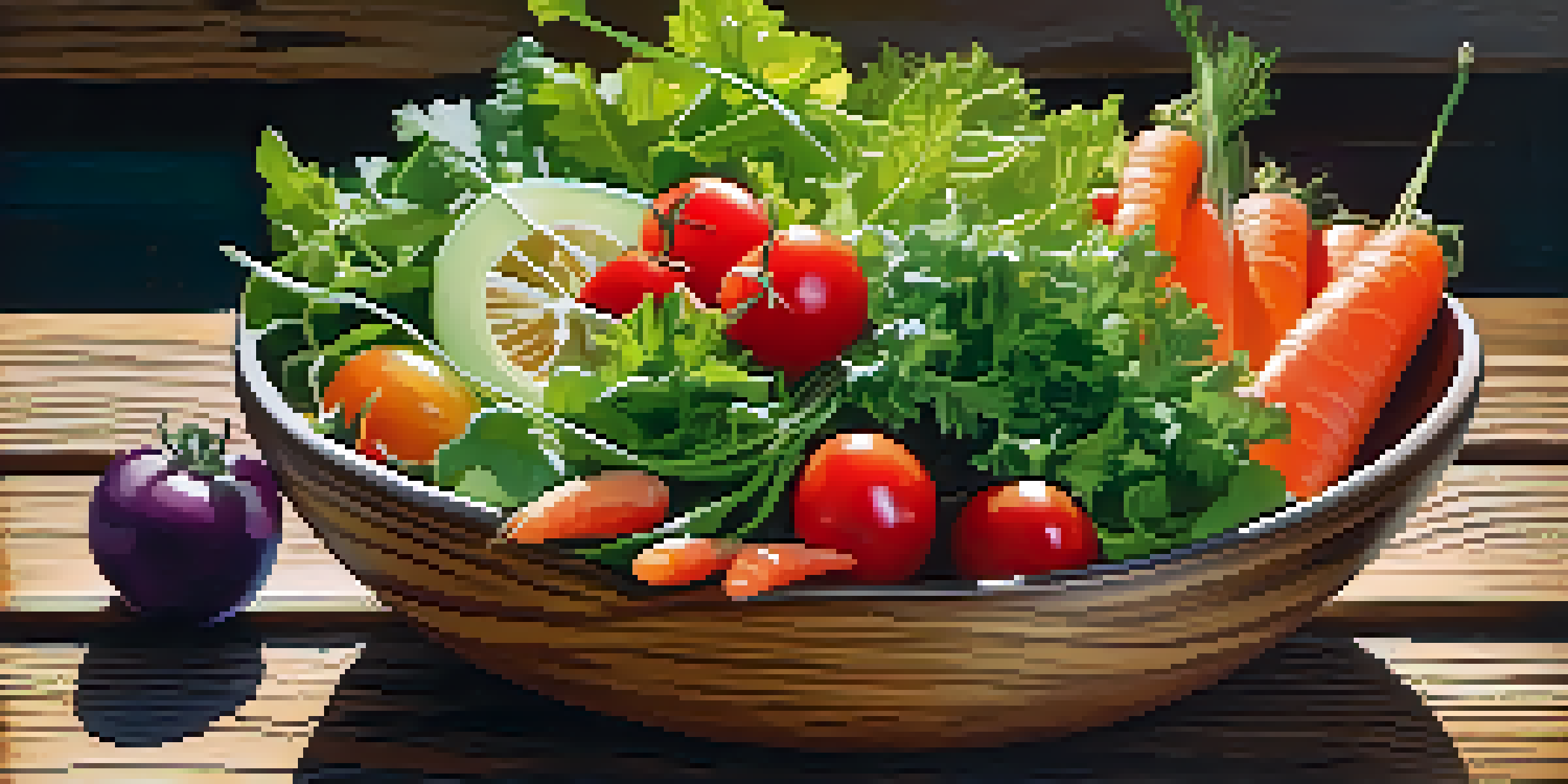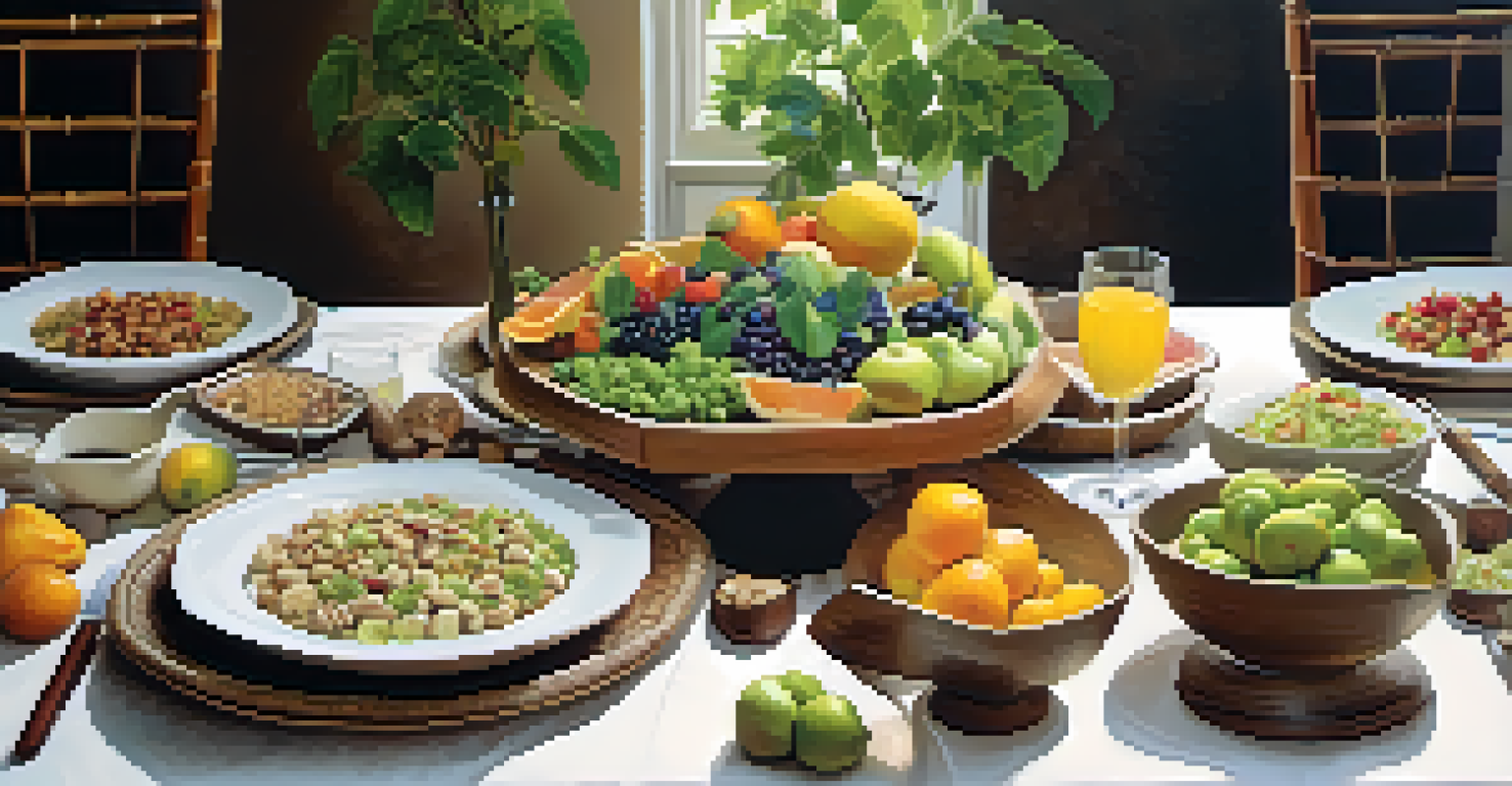Can Raw Food Diets Slow Down the Aging Process?

Understanding the Raw Food Diet Basics
A raw food diet primarily consists of unprocessed, uncooked foods. This usually includes fruits, vegetables, nuts, seeds, and sprouts. The idea behind this diet is that cooking can destroy essential nutrients and enzymes that are vital for our health.
Let food be thy medicine and medicine be thy food.
Advocates of raw food diets believe that eating foods in their natural state can lead to various health benefits. These can range from improved digestion to enhanced energy levels. The focus is often on consuming fresh, organic produce whenever possible.
While the diet can sound appealing due to its emphasis on whole foods, it's important to consider individual nutritional needs. For some, completely eliminating cooked foods might lead to nutrient deficiencies over time.
The Science Behind Aging and Diet
Aging is a complex process influenced by various factors, including genetics, lifestyle, and diet. Scientific studies have shown that certain foods can impact the body's aging at the cellular level. For instance, antioxidants found in fruits and vegetables can help combat oxidative stress, which is a contributor to aging.

Raw food diets are rich in these antioxidants, thanks to their high fruit and vegetable content. This can potentially slow down the aging process by reducing cellular damage. However, it's important to balance this with a variety of nutrients that may come from cooked foods.
Raw Food Diet Basics Explained
A raw food diet focuses on unprocessed, uncooked foods that can offer health benefits but may require careful consideration of nutritional needs.
Ultimately, while diet plays a critical role in aging, it's just one piece of the puzzle. Factors such as physical activity, stress management, and sleep also significantly influence how we age.
Nutrient Density in Raw Foods
Raw foods are often touted for their high nutrient density. This means they provide a significant amount of vitamins, minerals, and enzymes with relatively few calories. For example, leafy greens and brightly colored vegetables are packed with nutrients that support skin health and overall vitality.
You are what you eat.
Consuming a diet rich in these foods can help maintain bodily functions and promote a youthful appearance. Nutrients like vitamin C and E, found in many raw fruits and vegetables, are known for their skin-rejuvenating properties.
However, it's crucial to ensure that the diet remains balanced. Some nutrients, like beta-carotene, are more easily absorbed when foods are cooked, so a complete absence of cooked foods might not be ideal for everyone.
Potential Benefits for Skin Health
One of the most visible impacts of diet on aging is skin health. Raw food diets, rich in fresh produce, can contribute to a radiant complexion. Foods high in water content, like cucumbers and watermelon, can help keep the skin hydrated from the inside out.
Moreover, the vitamins and antioxidants in raw foods can aid in reducing fine lines and promoting elasticity. For instance, the vitamin C in strawberries and oranges supports collagen production, which is vital for maintaining skin firmness.
Nutrient Density of Raw Foods
Raw foods are nutrient-dense, providing essential vitamins and minerals, but a balanced approach including cooked foods can enhance nutrient absorption.
That said, skin health is multifaceted, so while a raw food diet can be beneficial, it should be complemented with good hydration, sun protection, and overall skincare practices.
The Role of Enzymes in Raw Foods
Enzymes are proteins that aid in digestion and metabolic processes in the body. Raw food proponents often emphasize that cooking destroys these vital enzymes, making raw foods easier to digest and more beneficial for health. Foods like sprouted grains and fermented vegetables are particularly enzyme-rich.
The theory is that by consuming more raw foods, one can enhance digestion and nutrient absorption, potentially leading to better overall health. Improved digestion can also contribute to a feeling of vitality and energy, which many associate with youthfulness.
However, it's worth noting that the body produces its own enzymes, and some people may find that cooked foods can also be easily digested. Balancing raw and cooked foods may provide the best of both worlds.
Exploring the Risks of a Raw Food Diet
While raw food diets can have benefits, they also come with certain risks. For example, completely avoiding cooked foods can lead to deficiencies in essential nutrients like iron and vitamin B12, which are more readily available in animal products and cooked foods.
Additionally, some people may experience digestive issues when consuming a high amount of raw fiber. It's crucial to listen to your body and adjust your diet accordingly. Consulting with a healthcare professional or nutritionist can help ensure you’re meeting your nutritional needs.
Finding Balance in Diet Choices
Incorporating both raw and cooked foods can optimize nutrient intake and promote overall health while addressing individual dietary preferences.
In short, while a raw food diet may offer some anti-aging benefits, it’s important to approach it thoughtfully to avoid potential health pitfalls.
Finding Balance: Raw vs. Cooked Foods
Finding the right balance between raw and cooked foods can be the key to reaping health benefits without compromising nutrition. Many experts suggest incorporating a variety of both to ensure optimal nutrient intake. For example, enjoying a colorful salad alongside a warm vegetable stir-fry can provide a wide range of nutrients.
Cooking can enhance the bioavailability of certain nutrients while preserving others in their raw form. This dual approach allows individuals to enjoy the benefits of both worlds, maximizing their overall health and potentially slowing the aging process.

Ultimately, the best diet is one that suits your personal preferences and lifestyle while meeting your nutritional needs. Listening to your body and being flexible with your food choices can lead to long-term health benefits.